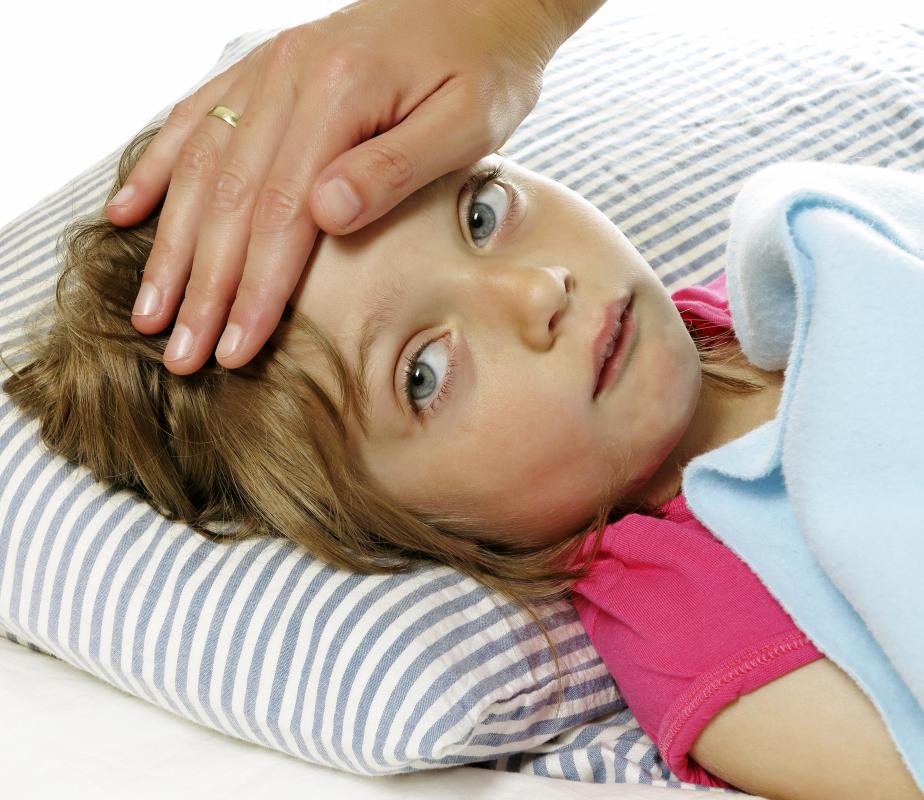At WiseGEEK, we're committed to delivering accurate, trustworthy information. Our expert-authored content is rigorously fact-checked and sourced from credible authorities. Discover how we uphold the highest standards in providing you with reliable knowledge.
What are the Signs of MRSA in Children?
MRSA is an antibiotic-resistant infection caused by the Staphylococcus aureus bacteria. The infection is transmitted by physical contact with an infected person or by getting the bacteria into a cut, sore, or opening. Children are often susceptible to the infection due to a high amount of casual contact with others, such as at school or in day care. Recognizing the symptoms of MRSA in children can result in faster medical treatment and less complications.
MRSA in children and adults generally presents as a type of skin infection. It may have the appearance of red bumps or pimples. The infection may appear near the entry point, such as on the borders of a cut, but may appear elsewhere on the body as well. MRSA is often misidentified as a spider or insect bite, leading to easy misdiagnosis.

Boils or pimples caused my MRSA in children can quickly develop into severely swollen abscesses. These may require draining and should be treated by a physician rather than at home. Other symptoms that may indicate MRSA include chills, fever, or breathing problems. These are often indicative of a serious infection that may be affecting the rest of the body.

Risk factors for MRSA in children include casual contact with others, low hygiene standards, crowded living quarters, and hospital visits. Since MRSA is so easily transmitted, hospitals and intensive care units are often a primary site for infections to occur. Post-operative patients are also susceptible, as their weakened immune systems may be less able to ward off the infection. Infants can contract MRSA through childbirth, which becomes dangerous not only for the infected child but all others kept in the infant ward of the hospital.

In severe cases, MRSA can move from a skin infection to the bloodstream, affecting the lungs, hearts, and bones. Since the infection is resistant to many antibiotics, treatment can be difficult and can sometimes be completely unsuccessful. Though recovery is common, some patients do die from MRSA related complications.
Although many skin infections are relatively harmless and not MRSA-based, some health care professionals suggest seeing a doctor if an abscess develops or if boils appear in conjunction with a MRSA outbreak at a child's school, day care, or hospital. Prompt examination of the tissue can ensure fast diagnosis, allowing doctors to begin treatment at once. MRSA in children often resolves without complications, though careful observation may be required to ensure that the infection is improving and not spreading after treatment.
AS FEATURED ON:
AS FEATURED ON:















Discussion Comments
@pleonasm - It doesn't surprise me that they don't disclose this to every patient, because it would cause panic. But MRSA is very widespread now, and, frankly, the way that modern medicine works, it's not going to go away any time soon.
All you can do is try to be as healthy as possible so your body will be able to fight off any infection, and avoid going to the hospital unless absolutely necessary.
@irontoenail - I don't know if they will always warn you. I think that might be the sort of thing you have to go searching for sometimes. My mother has had some heart problems and in the end they decided she needed a pacemaker and sent her to the big hospital.
But after that she had to go in to her usual hospital overnight for a different problem. When she told them the last place she had been treated, they completely isolated her and told her she couldn't be treated until they tested her for MRSA, because the big hospital was known to have it and they didn't want it.
She was never told that was a risk at any point until after it was too late (and luckily she didn't test positive for the bacteria anyway).
So I wouldn't take it for granted that a hospital or doctor would necessarily disclose to every patient that they are at risk for MRSA or a superbug in general.
Basically, there is no way to tell whether something is caused by MRSA until it is tested. Until that point, it will just seem like any other infection, because the main difference is only that it is resistant to antibiotics.
The only time I'd really be worried about this is if an infection or rash occurred after my child had been in the hospital (where this bacteria is common) or if there was a known outbreak in the area. Generally they try to keep tabs on this bacteria because it can be so dangerous and they will warn you if it is a problem in your community, particularly if MRSA is found in or on children.
Post your comments